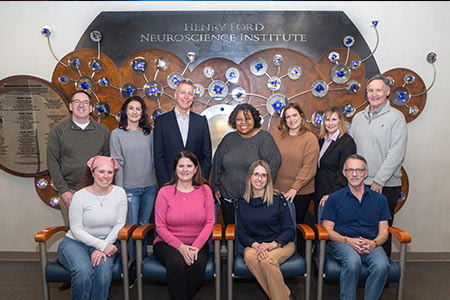Patient and Family Feedback Improves Healthcare
 Patients and family members are breaking the isolation of brain cancer as they make noteworthy changes in healthcare. For the last five years, members of the Patient Family Advocacy Group (PFAC) have been advising medical professionals about ways to improve clinic performance and help other patients. Accomplished by sharing experiences and providing feedback, their solutions are created by a group of people who went through hell and kept going.
Patients and family members are breaking the isolation of brain cancer as they make noteworthy changes in healthcare. For the last five years, members of the Patient Family Advocacy Group (PFAC) have been advising medical professionals about ways to improve clinic performance and help other patients. Accomplished by sharing experiences and providing feedback, their solutions are created by a group of people who went through hell and kept going.
“We’re not there for show, but to move the needle,” says Nestelynn Gay, Patient Resource Coordinator for Henry Ford. “We want to find out what worked and what didn’t work, and then we enact change. Nothing gets done without considering the patient.”
Belong and produce results
Nestelynn was diagnosed with a slow-growing oligodendroglioma in 2012 and monitored until 2019 when doctors “pulled the trigger” and treated the tumor with radiation and chemotherapy. Since that time, “the PFAC has become my baby,” laughs Nestelynn.
In her PFAC leadership role, Nestelynn is laser-focused on facilitation and steers the conversations to maintain productivity. She makes sure that people who feel shy or haven’t given feedback can say what’s on their mind.
“We get the best feedback when people feel like they belong and share their experiences,” says Nestelynn. She is also an advisor for the National Brain Tumor Society and the Low-Grade Glioma Registry.
At Henry Ford, there are approximately 40 different Patient and Family Advisor Councils, some short-term, others long term. Any department of Henry Ford can request a PFAC council. Through the PFACs, patient safety is improved, community links are established, and health outcomes are enhanced.
In the last several years, the group has influenced architects and designers to include more patient-friendly features in the Cancer Pavilion. At Henry Ford Macomb Hospital, advisors provided input to enhance patient areas, reduce possible infectious encounters and improve parking accessibility.
Also, group members were significant in the renovation of the Henry Ford Wyandotte Hospital Emergency Department, adjusting patient flow and establishing grieving rooms. In addition, participants make yearly updates to the handbook for brain cancer patients and their caregivers, ensuring that the handbook benefits the whole person, including those with special needs.
The unifying factor of PFAC members is the desire to help those suffering from cancer. They are independent thinkers, and their needs are considered independently. Some PFAC members have even been patients at different hospitals.
“One founding member of the PFAC group had a rare brain tumor. He felt disenfranchised and transitioned to a general cancer PFAC where he was very verbal and very comfortable. He found his niche,” says Nestelynn.
The stories about personal support and medical care reinforce my gratitude and reaffirm how lucky I am to have been treated at Henry Ford, says Nestelynn.
Promote safety and research
When her children were 1, 4 and 7, Megan Sauer, Pharm.D., was diagnosed with a stage 2 oligodendroglioma. After surgery, chemotherapy and radiation therapy, the 34-year-old pharmacist was invited to join the PFAC group. Megan specializes in medication safety at a different hospital where she’s employed.
“I bring the medical side of the discussion to the group. I look at things from a different angle based on the work I do at my medical facility. I ask questions that others might not have thought of. I am always trying to improve the patient care experience and safety, just as I would expect a patient to be cared for at the place where I work,” says Megan who advocates for new treatments and pharmaceutical studies at Henry Ford.
With patients and caregivers, she finds a strong connection. “I saw what my husband did as a caregiver. Through the group, I’ve learned different approaches of talking to caregivers about the trauma they were going through,” says Megan.
Act in memory
 For Marc Betman, who lost his wife Diane to glioblastoma in 2012, the PFAC group has been like therapy.
For Marc Betman, who lost his wife Diane to glioblastoma in 2012, the PFAC group has been like therapy.
“Diane would have said that if someone asked me to do something, I would do it,” says Marc. But he has another reason. “I don’t want others to go through what I went through. It was no one’s fault. It was just the situation. Now, I have the satisfaction knowing I’m helping and doing whatever I can do.”
Marc, a property manager in West Bloomfield, has raised thousands of dollars for brain cancer research and participated in Head for the Cure. In 2021, he was nominated for the Legacy of Love Award.
Relationships with PFAC members have had a strong impact on Marc. “We’re a family, and we’re fighting for the same things. If it helps just a little bit, that’s huge. In many ways, they are all big things that have a huge impact,” he says.
Since his wife’s passing, Marc and his two daughters have always been active in her memory. He takes comfort knowing that his wife donated her tumor to the Hermelin Tumor Bank, one of the largest in the world. “She’s helping, even though she’s been gone 11 years.”
See both sides
Former aerospace engineer and currently a personal trainer in Clinton Township, Ron Leach was referred to Henry Ford to treat grade 3 glioma. Now stable for nearly 10 years, he has written a book, “The Brain Train,” about his experience at Henry Ford.
Talking with caregivers in the PFAC group, Ron now understands what his wife went through and still experiences. “She has more scan anxiety than I do,” he says.
His goal is to have more caregivers attend meetings. After people come to the meetings and get into a rhythm, they want to be involved and improve the Henry Ford healthcare system, says Ron.
At the one-hour monthly meetings, he learns from guest speakers and co-participants who have unique stories and backgrounds. Compared to a clinical setting where a patient listens to a medical provider, PFAC group members talk to medical providers who appreciate feedback and even welcome criticism. “It puts the leash on things,” says Ron.
Take action
For patients and caregivers who can’t participate in a PFAC group but have comments to share, Ron says, “Use your voice. Call, send an email or a MyChart message. Nothing gets ignored.”
Facilitator Nestelynn adds, “If you have something positive to share, tell us so we can use it as an example of best practices for other care providers to follow.”
As researchers and clinicians are seeing the importance of incorporating patient voices in clinical practice and clinic flow, PFAC groups are growing and welcoming new members at Henry Ford. For many participants, the peer support and efforts to mitigate problems may have a rebound effect – more resilience and more healing from the inside out.
.svg?iar=0&hash=F6049510E33E4E6D8196C26CCC0A64A4)

/hfh-logo-main--white.svg?iar=0&hash=ED491CBFADFB7670FAE94559C98D7798)